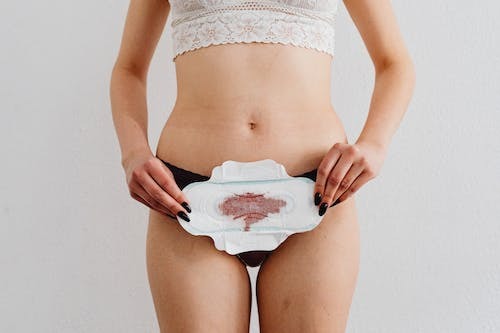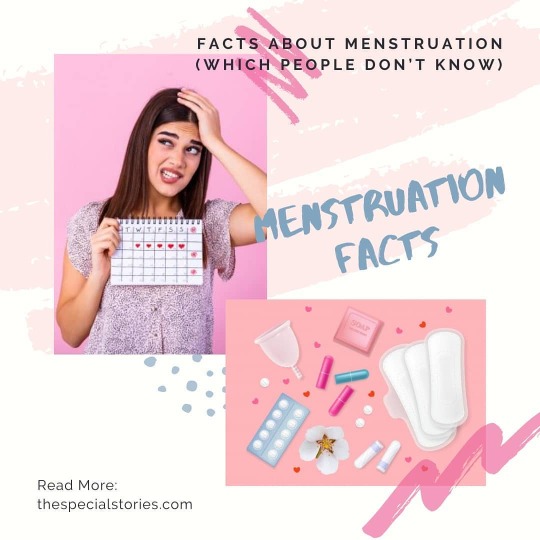#MenstruationFacts
Explore tagged Tumblr posts
Text
What is the typical amount of blood lost during menstruation?

Over 10 million women in the United States face the challenges of heavy bleeding each year. That means 1 in 5 women share the same concern you may be currently experiencing. Typically, menstrual cycles occur every 28 days, with periods lasting between three to seven days. If your period extends beyond eight days, it is considered lengthy. If heavy flow is significantly impacting your daily life, it may be beneficial to consult with a healthcare professional.
How much blood do you lose while on your period?
The amount of blood lost during menstruation varies for each woman, as we all have different bodies and menstrual cycles. On average, women typically lose between 2 to 5 tablespoons of blood during their period. It may seem like a larger quantity due to the nature of the flow. Here's a breakdown of the average blood loss per month:
Light period: Less than 2 tablespoons
Normal period: Less than 4 tablespoons
Heavy period: More than 6 tablespoons
It's important to note that these are general guidelines, and individual experiences may vary. If you have concerns about the amount of blood you're losing during your period, it's always a good idea to consult with your healthcare provider for personalized advice and guidance.
Is there a way to determine how much you’re actually bleeding?
Determining the exact amount of blood you're losing during your period can be challenging. While a mathematical equation involving the number of pads or tampons used can provide an estimate (by multiplying the number of products by 0.35), there are simpler methods available.
One popular option is using a menstrual cup, which offers an easy and effective way to measure blood loss. Menstrual cups often have measurements marked on them, allowing you to see the amount of blood collected between emptying and cleaning. However, it's important to note that using a menstrual cup may come with challenges such as difficulty with insertion or removal, as well as potential vaginal irritation. Finding the right fit for a menstrual cup can also be a trial-and-error process.
To ensure added protection while wearing a menstrual cup and to prevent leaks, it may be beneficial to consider using leak-proof underwear. These underwear provide an additional layer of security, giving you peace of mind during your period.
Remember, if you have concerns about the amount of blood you're losing during your period or if you experience any unusual symptoms, it's always recommended to consult with your healthcare provider for personalized advice and guidance.
Causes of Excessive Menstrual Bleeding
Influence of IUDs
IUDs can have varying effects on menstrual flow. Depending on the type of IUD, it can either reduce or increase your period's intensity. Research suggests that copper IUDs may lead to more severe and painful periods.
Presence of Fibroids
Fibroids are noncancerous growths that develop in the muscle tissue of the uterus. If you have fibroids, you may experience longer periods lasting more than 8 or 9 days. Some women also notice increased frequency, with periods occurring more than once a month.
Hormonal Imbalances
Imbalances in hormone levels can contribute to heavy menstrual bleeding. Elevated estrogen levels and low progesterone levels are often associated with heavier flows. Conversely, low estrogen levels can lead to lighter bleeding and shorter periods.
Tips for Alleviating Symptoms of Heavy Bleeding
Track Your Period
Keeping a menstrual cycle record allows you to better understand your cycle and detect any irregularities. By monitoring your period, you can identify patterns, mood changes, and potential hormonal or cycle disruptions. Sharing your history with healthcare professionals can aid in diagnosing the causes of hormonal or cycle changes.
Consider Period Underwear for Heavy Flow
Beautikiniperiod underwear is an ideal choice for individuals with heavy or ultra-heavy flows. A single pair of heavy flow period underwear can hold the equivalent of 4 regular tampons. It provides odor reduction and eliminates the need for additional pads or tampons. For super-heavy flow, Beautikiniperiod underwear can hold up to 5 regular tampons, offering reliable overnight protection. Period underwear is an eco-friendly and chemical-free solution, as it is reusable and free of toxic substances.
Utilize Heating Patches
While heating patches may not reduce menstrual flow, they can alleviate the pain associated with heavy bleeding.
Consume Iron-Rich Foods
Heavy periods can sometimes lead to anemia. Consuming iron-rich foods, such as green vegetables, raisins, and apricots, can naturally boost your iron levels.
Engage in Exercise
Even during heavy flow, moderate exercise can be beneficial. It helps increase blood flow and triggers the release of endorphins, which can alleviate cramping. However, be mindful of your body's limits and listen to any signs of fatigue.
Stay Hydrated
During menstruation, blood volume can decrease. It is recommended to drink at least 8 cups of water daily. However, during heavy periods, increasing water intake by an additional 4 to 6 cups per day is advised. Consider hydrating with electrolyte-enriched drinks for added benefits.
Excessive Menstrual Bleeding (Menorrhagia)
Menorrhagia, also known as excessive menstrual bleeding, is a medical condition characterized by prolonged periods lasting more than 7 days or requiring frequent tampon or pad changes within a 2-hour timeframe. While menorrhagia is more prevalent among older women, it is less common in younger women. Although heavy bleeding is generally not life-threatening, it can become a concern if excessive blood loss occurs.
When to Seek Medical Attention
It is important to consult with your doctor if you experience any of the following symptoms:
- Passing quarter-sized or larger blood clots during your period
- Feeling tired and dizzy upon standing up
- Changing 2 or more tampons or pads every hour for 2 consecutive hours
- Experiencing post-menopausal bleeding
- Bleeding that lasts longer than a week
- Feeling fatigued and unable to perform daily activities
Heavy bleeding is a common reason for women to visit their gynecologist annually. It is understandable to feel overwhelmed and isolated when dealing with heavy periods. However, remember that there is help available. Discuss your concerns with your doctor to determine the most suitable treatment options for you. In the meantime, consider using period underwear specially designed for heavy flow, allowing you to enjoy your activities without worrying about leaks or odors during your period.
#Beautikini#Periods#menstruation#period underwear#MenstrualFlow#PeriodBlood#MenstrualCycle#MenstrualHealth#PeriodFlow#MenstrualBleeding#HeavyPeriods#LightPeriods#PeriodVolume#MenstruationFacts#women#girls#female#health#healthcare
0 notes
Photo

Menstruation is nature’s way to tell a woman that she is growing up in a perfect way, as a healthy woman... Let's have some facts. Link in bio. . . #menstruation #menstruating #menstrualhealth #menstrualcup #menstrualcycle #facts #mustreadlist #mustread #factsoflife #period #periodfacts #menstruationfacts #painfulperiods #periods #periodcramps #lifestyle #lifestyleblogger #women #womenproblems #helpeachother #lifeisgood #instagram #insta #instagood #instadaily #blog #blogging #bloggerlife #blogpost #thespecialstories (at FACTS) https://www.instagram.com/p/CDdzEcxjbRf/?igshid=1lfijtmlrfb7
#menstruation#menstruating#menstrualhealth#menstrualcup#menstrualcycle#facts#mustreadlist#mustread#factsoflife#period#periodfacts#menstruationfacts#painfulperiods#periods#periodcramps#lifestyle#lifestyleblogger#women#womenproblems#helpeachother#lifeisgood#instagram#insta#instagood#instadaily#blog#blogging#bloggerlife#blogpost#thespecialstories
1 note
·
View note
Text
Here are some period facts for you because I'm miserable
Right now, my ovaries are literally cutting off their own blood supplies. They are trying to commit suicide. That is what cramps really are.
Before tampons and pads, a woman would sit on a stack of hay in a hut with other women on their periods because it was indecent to bleed around men.
In earlier Christianity, women would be denied communion during menstrual cycles.
Women will spend approximately 35,000 days on my period in my lifetime.
The Romans attribute the deformity of Vulcan to the menstrual intercourse of his parents, Juno and Jupiter.
Menstruation may have led to humanity's sense of time as most lunar calendars were based on the length of a woman's menstrual cycle.
Menstrual blood was thought to cure warts, birthmarks, gout, goiters, hemorrhoids, epilepsy, worms, leprosy, and headaches. It was also used in love charms, could ward off demons, and was occasionally used as an offering to a god. The first napkin worn by a virgin was thought to be a cure for the plague.
The egg is the largest human cell in the body and can be seen with the naked eye.
At one point in history, women who complained of cramps were sent to psychiatrists because they were seen as a rejection of one's femininity.
Ancient Egyptians used softened papyrus as rudimentary tampons. Hippocrates notes that the Greeks used lint wrapped around wood. The modern tampon was invented by Dr. Earle Haas in 1929, which was called a “catamenial device” or “monthly device.” He trademarked the brand name Tampax.
Nicknames for a menstrual period include Aunt Flo, On the Rag, I’m at a Red Light, Surfing the Crimson Tide, Checked into Red Roof Inn, Curse of Dracula, Leak Week, My Dot, and Monthly Oil Change.
The Mae Enga people of Papua New Guinea believe that contact with menstrual blood or a menstruating woman will “sicken a man and cause persistent vomiting.” It will also “kill his blood so that it turns black, dull his wits, and lead to a slow death.”
The same chemicals that cause uterine contractions during menstruation also cause the lower intestine to contract as well, which can lead to diarrhea.
In many cultures, a fetus was thought to be formed in the womb by clotting menstrual blood.
In some parts of India, a woman indicates she is menstruating by wearing a handkerchief around her neck stained with her menstrual blood.
Scholars suggest that as matriarchy gave way to patriarchy, menstrual blood taboos were used by men to control women and, consequently, menstrual blood was interpreted away from something powerful to a “disgusting” waste product that had no role in the reproductive process.
30 notes
·
View notes